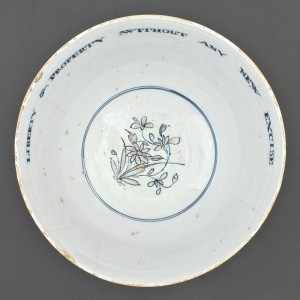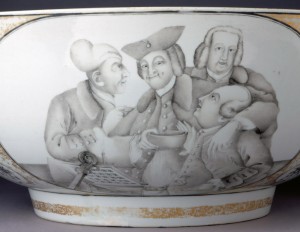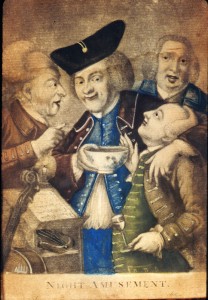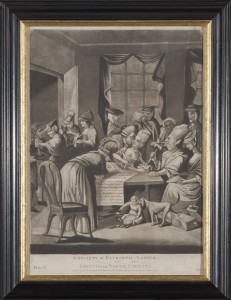Wine and other beverages also were shared among those who commiserated over unhappy changes in governmental policy. Just as today, tax increases were particularly irksome and inspired a broad range of responses, from literary publications to satirical prints and inscriptions on punch bowls.
 Punch bowl
Punch bowl
Possibly London, England; 1710–35
Earthenware (delftware)
Inscribed on interior “LIBERTY & PROPERTY WITHOUT ANY NEW EXCISE”
Bequest of Henry Francis du Pont 1961.1588
Although it is tempting to associate the no-excise sentiment on this vessel with the 1765 Stamp Act imposed on colonial Americans by England, the size and painting style indicate that the bowl dates much  earlier. The inscription perhaps refers to one of the many taxes—some increasing fees on alcoholic beverages—supported during the 1720s and 30s by English politicians including the famous Horace Walpole . In most cases, such taxes were applied to Englishmen and colonists alike.
earlier. The inscription perhaps refers to one of the many taxes—some increasing fees on alcoholic beverages—supported during the 1720s and 30s by English politicians including the famous Horace Walpole . In most cases, such taxes were applied to Englishmen and colonists alike.
 Punch bowl commemorating John Wilkes
Punch bowl commemorating John Wilkes
Jingdezhen, China; 1764–70
Porcelain
Bequest of Henry Francis du Pont 1960.503
NIGHT AMUSEMENT
 Carington Bowles
Carington Bowles
London, England; 1750–75
Hand-colored mezzotint on laid paper
Gift of George H. Blackshire 1987.42.1a,b
This punch bowl portrays English politician and Member of Parliament John Wilkes, who supported American rights. He was controversial in Englandfor his championing of “the cause of the people” against the government, most notably in one issue of his  satirical publication The North Briton in 1763. English ceramic plates inscribed in his honor have been excavated at 18th-century sites inAmerica.
satirical publication The North Briton in 1763. English ceramic plates inscribed in his honor have been excavated at 18th-century sites inAmerica.
The reverse side of the bowl shows a drinking scene based on a popular print entitled NIGHT AMUSEMENT. Both images are thought to portray a group of friends that includes Edward Bamfield, “The Staffordshire Giant” (in a tricorn hat) who performed at London’s Covent Garden. In this scene, one man illustrates the popular way of holding a wineglass by the base. (This print was made as a pair with one titled MIRTH AND FRIENDSHIP. )
Issue No. 45 of John Wilkes’s North Briton (1763) supported equal rights and was not forgotten on the eve of the American Revolution. It inspired a 1768 patriotic event in Charleston, South Carolina:
CHANICKS and other inhabitants of [Charleston met to discuss who might represent them.] . . . About 5 o’clock, they all removed to a most noble LIVE-OAK Tree . . . which they formally dedicated to LIBERTY, where many loyal, patriotic, and constitutional toasts, were drank . . . ln the evening, the tree was decorated with 45 lights, and 45 sky-rockets were [shot off]—About 8 o’clock, the whole company, preceded by 45 of their number, carrying as many lights, marched . . . to [a] tavern; where the 45 lights being placed upon the table, with 45 bowls of punch, 45 bottles of wine , and 92 glasses they spent a few hours in a new round of toasts, among which, scarce a celebrated Patriot of Britain or America was omitted.
The South Carolina Gazette, October 3, 1768
A Society of Patriotic Ladies, at Edenton in North Carolina
 Robert Sayer and J. Bennett
Robert Sayer and J. Bennett
London, England; March 25, 1775
Mezzotint on laid paper
Bequest of Henry Francis du Pont 1957.1255, 1966.1325
This satirical print, published in London, shows a group of ladies in North Carolina signing an agreement to give up both tea drinking and the wearing of clothing manufactured in England. In the background, tea is being dumped out of canisters, and near the window a lady holds a punch bowl (rather than a teacup) to her lips.
Related Themes:
